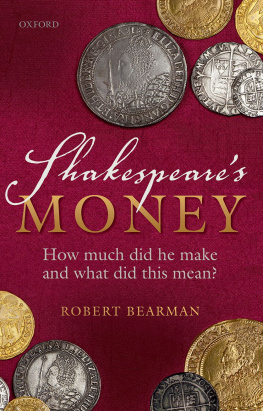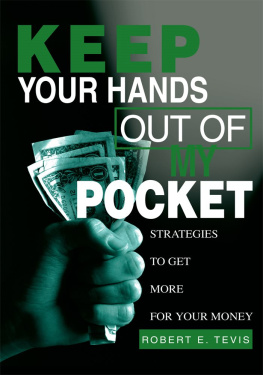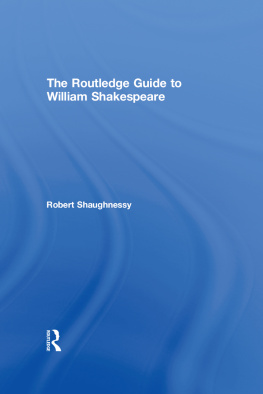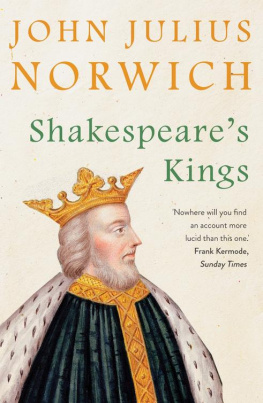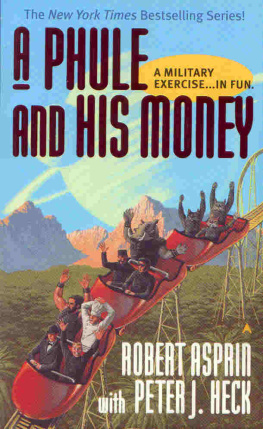Bearman Robert - Shakespeares money: how much did he make and what did this mean?
Here you can read online Bearman Robert - Shakespeares money: how much did he make and what did this mean? full text of the book (entire story) in english for free. Download pdf and epub, get meaning, cover and reviews about this ebook. City: Oxford, year: 2018;2016, publisher: Oxford University Press, genre: Detective and thriller. Description of the work, (preface) as well as reviews are available. Best literature library LitArk.com created for fans of good reading and offers a wide selection of genres:
Romance novel
Science fiction
Adventure
Detective
Science
History
Home and family
Prose
Art
Politics
Computer
Non-fiction
Religion
Business
Children
Humor
Choose a favorite category and find really read worthwhile books. Enjoy immersion in the world of imagination, feel the emotions of the characters or learn something new for yourself, make an fascinating discovery.
- Book:Shakespeares money: how much did he make and what did this mean?
- Author:
- Publisher:Oxford University Press
- Genre:
- Year:2018;2016
- City:Oxford
- Rating:3 / 5
- Favourites:Add to favourites
- Your mark:
- 60
- 1
- 2
- 3
- 4
- 5
Shakespeares money: how much did he make and what did this mean?: summary, description and annotation
We offer to read an annotation, description, summary or preface (depends on what the author of the book "Shakespeares money: how much did he make and what did this mean?" wrote himself). If you haven't found the necessary information about the book — write in the comments, we will try to find it.
Bearman Robert: author's other books
Who wrote Shakespeares money: how much did he make and what did this mean?? Find out the surname, the name of the author of the book and a list of all author's works by series.
Shakespeares money: how much did he make and what did this mean? — read online for free the complete book (whole text) full work
Below is the text of the book, divided by pages. System saving the place of the last page read, allows you to conveniently read the book "Shakespeares money: how much did he make and what did this mean?" online for free, without having to search again every time where you left off. Put a bookmark, and you can go to the page where you finished reading at any time.
Font size:
Interval:
Bookmark:


Great Clarendon Street, Oxford, ox 2 6 dp , United Kingdom
Oxford University Press is a department of the University of Oxford. It furthers the Universitys objective of excellence in research, scholarship, and education by publishing worldwide. Oxford is a registered trade mark of Oxford University Press in the UK and in certain other countries
Robert Bearman 2016
The moral rights of the author have been asserted
First Edition published in 2016
Impression: 1
All rights reserved. No part of this publication may be reproduced, stored in a retrieval system, or transmitted, in any form or by any means, without the prior permission in writing of Oxford University Press, or as expressly permitted by law, by licence or under terms agreed with the appropriate reprographics rights organization. Enquiries concerning reproduction outside the scope of the above should be sent to the Rights Department, Oxford University Press, at the address above
You must not circulate this work in any other form and you must impose this same condition on any acquirer
Published in the United States of America by Oxford University Press 198 Madison Avenue, New York, NY 10016, United States of America
British Library Cataloguing in Publication Data
Data available
Library of Congress Control Number: 2015949827
ISBN 9780198759249
ebook ISBN 9780191077067
Printed in Great Britain by Clays Ltd, St Ives plc
Links to third party websites are provided by Oxford in good faith and for information only. Oxford disclaims any responsibility for the materials contained in any third party website referenced in this work.
Much of my working life has been spent in the cataloguing and arrangement of archive material and in its interpretation as evidence of past events. In the process I have inevitably come to feel that, if the documentary evidence is not there, then there is little point in speculating about what might have happened. Even the evidence we do have is not always reliable or sufficiently definitive, but at least something survives on which to base an argument as opposed to a hypothesis dependent on the discovery of new data. As it happens, and as is repeatedly pointed out, the evidence for a study of Shakespeares life is very limited, but I have chosen not to lament this shortage of material or to give vent to customary expressions of frustration; rather to take a positive attitude towards what evidence we do have to interpret one particular aspect of his life which is not often discussed, namely to what degree did Shakespeare prosper financially and what place in society did he thereby come to occupy. After all, to his contemporaries this would have been the most immediate measure of his success; and indeed, is the best-documented aspect of his career.
Several people have read drafts of what follows and I am very grateful for their comments, particularly from David Ellis, Mairi Macdonald, James Shapiro, and Martin Wiggins. Stanley Wells has also been generous with his time and advice. The staff at the Shakespeare Birthplace Trusts Library and Archive, where the bulk of the original documentation I have used is safely lodged, have been very helpful, as have those at The National Archives, the Folger Shakespeare Library and the College of Arms, particularly in their prompt and efficient supply of images. I have also benefited from the frequent use of the facilities offered by the Shakespeare Institute (University of Birmingham) Library. David Kathman has generously supplied me with copies of unpublished material and John Taplins encyclopaedic knowledge of the genealogy of Shakespeares local contemporaries has been invaluable. But it would be remiss not to include posthumous tributes to those earlier scholars who over the years have provided transcripts and facsimiles of all the key documents on which we depend, most notably J.O. Halliwell-Phillips, E.K. Chambers, B. Roland Lewis and S. Schoenbaum, whose frequent appearances in the footnotes bear witness to the enduring value of their work. Lastly, I must thank my wife, Jan Bunyan, my sternest critic when it comes to matters of grammar and infelicities of expression but whose superior computer skills also came into play when, in the twelfth hour, I was driven to the use of updated (and unfamiliar) operating systems and programmes.
Robert Bearman
June 2015
| BL | British Library, London |
| CSPD | Calendar of State Papers Domestic |
| HMC | Historical Manuscripts Commission |
| ODNB | Oxford Dictionary of National Biography |
| SCLA | Shakespeare Centre Library and Archive, Stratford-upon-Avon |
| TNA | The National Archives, London |
| WCRO | Warwickshire County Record Office |
It is not possible to write a biography of William Shakespeare within the normally accepted meaning of the word. One would hardly think so in view of the number of attempts which have been made, but the basic requirement for such an exercise simply does not existnamely, a body of evidence allowing insight into the subjects feelings and views backed up with details of his or her day-to-day life and of the opinions of others on the subjects shortcomings, achievements, and appearance. Even in the most fully documented of lives, there will be gaps, but, provided other, and longer, episodes of the subjects life can be explored through the survival of letters, diaries, and a wide range of other documents in which he or she may feature, a full enough picture will emerge. But for Shakespeare, such material is almost entirely lacking: in fact, Shakespeare is mentioned by name in handwritten documents drawn up during his lifetime on fewer than a hundred occasions. None of these is in his hand (though four are signed by him) and only two or three can be said to establish his own feelings in a direct mannerhis attitude, for example, towards the attempt to enclose some open field area at Welcombe, just outside Stratford, in which he had a vested interest, and some of the clauses contained in his will. A similar number may reflect views which his contemporaries had towards himRichard Quineys letter, for instance, asking him for help in negotiating a loan of 30. We also have Ben Jonsons appraisal of Shakespeares abilities and character, which, because it may never have been intended for publication, has the air of a genuine assessment, even if by a person with his own agenda and written some years after Shakespeares death. In the face of such meagre resources, we might normally expect a biographer to abandon hope. A scattering of references to the potential subject might perhaps be used for a skeletal reconstruction of his or her life, but such a study would not be the stuff of biography as it is normally understood. A man who rarely emerges from the shadowsand whose sporadic appearances then pose as many questions as they answerwould under normal circumstances be thought too challenging, if not impossible, a subject.
There is, of course, nothing suspicious about this poor harvest. The survival of documentary evidence from this period depended overwhelmingly on whether or not it remained in the hands of either an institution or a great landed family with the resources to provide a safe haven over a period of time. Governmental records, at parish, county, and national level, and those of educational, ecclesiastical, and other official institutions, therefore form the bulk of what has survived, buttressed by the archives of land-owning families who managed to maintain their status over several generations. This is far from saying that the archives falling into such categories have survived in anything like their entirety. Here huge tranches have been lost too, but at least there was a framework of sorts to catch some of them. Alongside these, the most common survival are bundles of title deeds for the simple reason that the owners of freehold property from all social levels took zealous care to preserve them as proof of title and to pass them on when properties changed hands. Beyond this, the chances of survival of any personal or business papers, once they had served the immediate purpose for which they had been created, were very slim indeed. It follows that biographical data for particular individuals, especially at this early period, depend largely on whether or not they came within the orbit of record-keeping agencies. If he or she (usually he) operated from within one, of course, data are comparatively plentifulfor example, we know more about the daily life of Shakespeares father John, because of his involvement in the affairs of the Stratford Corporation and whose records have survived in some abundance, than we do about Shakespeare himself. If he or she was frequently involved in legal disputes, either as plaintiff or defendant, then further revealing data can often be unearthed from the records of central and local courts. For members of the countrys landed elite, and those who worked for them, data can normally be retrieved both from family papers and the records of the institutions in whose affairs they became involved. Shakespeare, however, attended a school whose records are lost, did not go to university, was hardly ever involved in legal proceedings, and worked for most of his life, not within a government institution or for a great landed family, but for a theatrical company whose records no longer survive. We do have his title deeds for the very practical reason that his successors in title took care to preserve them, but otherwise, for him as for countless thousands of his contemporaries, we largely depend on the number of times his activities were recorded in the files of those organizations whose archives have come down to us. Thus our knowledge of Shakespeares involvement in the Welcombe enclosure comes not from his papers but from those of Thomas Greene, which he left behind him in the Corporation archiveshe was the towns stewardwhen he sold up and left Stratford in 1617. Similarly, the precious bundle of Richard Quineys correspondence, including the famous letter to Shakespeare and its other references to him, has survived simply because it was subsumed into the Corporation archives as the result of Bailiff Quineys death in office in 1602. On other occasions, Shakespeare and his family are recorded in parish registers, wills, surveys, and tax records on a disappointingly meagre number of occasions, but entirely typical of many other men and women who lived and worked outside the official establishment or the households of the great. There are important exceptions to this, of course, often the result of the chance survival of rare or atypical archive material. The diary of Philip Henslowe, for instance, the manager of the Rose Theatre, crucial for our understanding of the Elizabethan theatre, only survived because it passed into the hands of his son-in-law, Edward Alleyn, and thence into the care of the college he founded at Dulwich. Records for Shakespeares companythe Chamberlains, later the Kings Menwhich must also once have existed, unluckily, though typically, have not come down to us.
Font size:
Interval:
Bookmark:
Similar books «Shakespeares money: how much did he make and what did this mean?»
Look at similar books to Shakespeares money: how much did he make and what did this mean?. We have selected literature similar in name and meaning in the hope of providing readers with more options to find new, interesting, not yet read works.
Discussion, reviews of the book Shakespeares money: how much did he make and what did this mean? and just readers' own opinions. Leave your comments, write what you think about the work, its meaning or the main characters. Specify what exactly you liked and what you didn't like, and why you think so.

